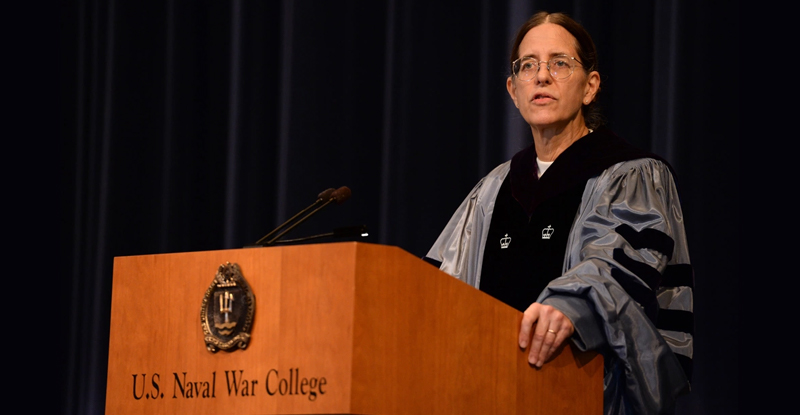By Francis Sempa | Real Clear Defense
At first glance, a recent essay on the Foreign Affairs website by Sarah C.M. Paine, emeritus professor of history and grand strategy at the U.S. Naval War College, appears to be a classical geopolitical analysis that frames current great power competition through a maritime vs. continental prism: Mahan vs. Mackinder, if you will.
But a close reading of Paine’s essay reveals its true purpose: to use the respectable aura of geopolitics to criticize the Trump administration’s America First approach to national security.
Professor Paine, you see, believes that Donald Trump is a threat to our democracy. And the Trump-led Republican Party, she believes, “threatens us all.”
Her anti-Trump mindset leads her to make some revealing statements in an interview she gave in January 2024, such as if Trump was in office in 2022, “there would be no Ukraine today, Russian armies would be on Poland’s borders, and the West would be in a much weaker position to defend itself.”
Perhaps professor Paine forgot that Russia only recently seized Ukrainian territory during the Obama and Biden presidencies, and that it is Trump who is attempting to end a war that has resulted in hundreds of thousands of casualties. Dr. Paine, however, wants the war to go on to weaken Russia and Putin’s regime.
In that January 2024 interview, Dr. Paine identified the election of Trump, not foreign adversaries, as the “immediate security threat for the United States” because in her view “Trump will fast-track [an] authoritarian dystopia.”
She suggested that the Trump-led Republican Party “has run its course.” The American electorate thought otherwise.
It is ideology, not geopolitics, that informs Dr. Paine’s analysis. She has argued that Russia’s leaders “aim to recreate the Soviet empire and cannot coexist with democracy.” She has also invoked her own version of the discredited domino theory, claiming “If Ukraine falls, Moldova, the Baltic States will be next and then comes Poland.” “For Russia,” Paine says, “Ukraine is simply a menu item—the appetizer before getting on with the meal.”
In her Foreign Affairs essay, professor Paine even suggests that France may be on the Kremlin’s menu. She transforms maritime vs. continental geopolitics into democracy vs. autocracy ideology.
Paine apparently believes that dictatorships and democracies cannot coexist, even though they have done so throughout most of America’s history. She applauds NATO’s enlargement and complains that anyone who believes that it helped provoke Russia’s aggression is simply falling for the Kremlin’s disinformation.
Presumably, Dr. Paine believes that she knows more about what makes Russia tick than, say, George Kennan, Richard Pipes, Jack Matlock, Jr, William Burns, Marshal Shulman, Paul Nitze, Edward Luttwak, and the many others who tried to warn America’s leaders that NATO enlargement would produce Russian aggression.
Her goal in the Ukraine war, she makes clear, is to bring about regime change in Russia.
In her January 2024 interview, Dr. Paine urged Americans not to re-elect or donate to Trump.
Her “solution” to the border crisis was to encourage investment in Central America.
Americans, she said, should stop “obsessing” over “limiting bathroom access, personal pronoun use, rare cases of transgender amateur sports participation, and intervening in other people’s health care.”
For Dr. Paine, those issues are unimportant compared to Ukraine’s survival. “If Ukraine loses,” she says, “the international order will crumble.” Indeed, judging by the January 2024 interview and her Foreign Affairs essay, she appears to worship at the altar of the “rules-based international order.”
The so-called rules-based international order is nothing more than a semantic disguise for the promotion of global governance. Which is why Dr. Paine and so many of our foreign policy establishment hate America First.
Paine gives this away in her essay, comparing Trump’s approach to the world to Napoleon’s: imposing trade barriers, rupturing alliances, picking fights with neighbors, etc. Yet, Trump, unlike Napoleon, has focused on ending wars not starting them.
The rules-based international order so cherished by Dr. Paine has always been a myth—a myth promoted by those who view themselves more as citizens of the world than citizens of their own countries.
This myth has enabled, for example, our European allies to get away with having the United States shoulder most of the burden of providing for their ultimate security, while they spend lavishly on domestic social programs to gain favor with their citizens.
This myth has made the United States act as the world’s policeman, intervening in conflicts that often have nothing to do with concrete American interests.
This myth has led many of our leaders to make “human rights” and democracy promotion integral elements of American foreign policy.
In the end, even overlooking Dr. Paine’s Trump Derangement Syndrome, it is hard to take seriously a professor of grand strategy that writes about America’s “friends” and the importance of “moral capital” in global politics.
It was the great Prussian/German statesman Otto von Bismarck who said that an ideal foreign policy is “freedom from prejudice, the independence of our decisions from impressions of dislike or affection for foreign states and their governments.”
It was Britain’s Lord Palmerston who said that his country had “no eternal allies” and “no perpetual enemies,” only “interests [that] are eternal and perpetual.”
And it was America’s own George Washington who said that “nothing is more essential than that permanent, inveterate antipathies against particular nations and passionate attachments for others should be excluded” from our country’s external relations. I think that President Trump would agree.
Francis P. Sempa is an attorney and the author of Geopolitics: From the Cold War to the 21st Century and America’s Global Role: Essays and Reviews on National Security, Geopolitics and War.
First published in Real Clear Defense
Previous articles by Sempa:








Leave a Comment